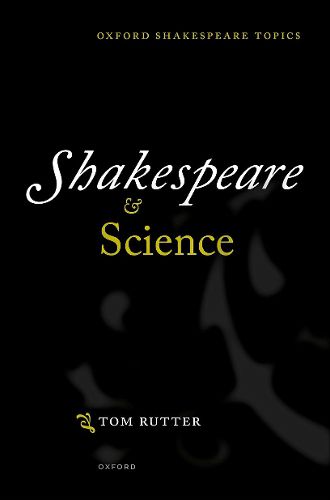Readings Newsletter
Become a Readings Member to make your shopping experience even easier.
Sign in or sign up for free!
You’re not far away from qualifying for FREE standard shipping within Australia
You’ve qualified for FREE standard shipping within Australia
The cart is loading…






As a figurehead for the literary humanities, and a dramatist whose plays feature fairies, ghosts, and spirits, Shakespeare may not be the first author that comes to mind when thinking about science. Tom Rutter shows, however, that in his plays and poetry Shakespeare made detailed use of the knowledge and theories of the cosmos, the natural world, and human biology that were available to him. These range from astronomical and anatomical ideas derived from medieval scholars, Islamic philosophers, and ancient Greek and Roman authorities, through to the challenges issued to those earlier models by more recent figures such as Copernicus and Vesalius. Shakespeare's treatment of these materials was informed by the poetic and dramatic media in which he worked; the dialogic nature of drama enabled an approach that could be provisional, exploratory, and tolerant of uncertainty and contradiction. Shakespeare made the early modern playhouse a venue for the production of scientific understanding through performance, illusion, and the creative use of space.As well as surveying current scholarship that contextualizes Shakespeare's work in relation to histories of meteorology, matter theory, humoral physiology, racialization, mathematics, and more, Shakespeare and Science offers detailed original readings of a variety of texts including the Histories, Hamlet, Antony and Cleopatra, Othello, King Lear, The Tempest, the Sonnets, and Lucrece. It also makes extensive reference to works by Shakespeare's near-contemporaries such as Robert Recorde, William Fulke, Juan Huarte, and Thomas Elyot. Its four chapters focus on astronomy and meteorology, matter, the body, and mathematics. Rutter's overall approach is informed by recent studies that interrogate 'science' as a concept, and that question both the boundary between literature and science and the idea of a seventeenth-century 'scientific revolution'.
$9.00 standard shipping within Australia
FREE standard shipping within Australia for orders over $100.00
Express & International shipping calculated at checkout
As a figurehead for the literary humanities, and a dramatist whose plays feature fairies, ghosts, and spirits, Shakespeare may not be the first author that comes to mind when thinking about science. Tom Rutter shows, however, that in his plays and poetry Shakespeare made detailed use of the knowledge and theories of the cosmos, the natural world, and human biology that were available to him. These range from astronomical and anatomical ideas derived from medieval scholars, Islamic philosophers, and ancient Greek and Roman authorities, through to the challenges issued to those earlier models by more recent figures such as Copernicus and Vesalius. Shakespeare's treatment of these materials was informed by the poetic and dramatic media in which he worked; the dialogic nature of drama enabled an approach that could be provisional, exploratory, and tolerant of uncertainty and contradiction. Shakespeare made the early modern playhouse a venue for the production of scientific understanding through performance, illusion, and the creative use of space.As well as surveying current scholarship that contextualizes Shakespeare's work in relation to histories of meteorology, matter theory, humoral physiology, racialization, mathematics, and more, Shakespeare and Science offers detailed original readings of a variety of texts including the Histories, Hamlet, Antony and Cleopatra, Othello, King Lear, The Tempest, the Sonnets, and Lucrece. It also makes extensive reference to works by Shakespeare's near-contemporaries such as Robert Recorde, William Fulke, Juan Huarte, and Thomas Elyot. Its four chapters focus on astronomy and meteorology, matter, the body, and mathematics. Rutter's overall approach is informed by recent studies that interrogate 'science' as a concept, and that question both the boundary between literature and science and the idea of a seventeenth-century 'scientific revolution'.